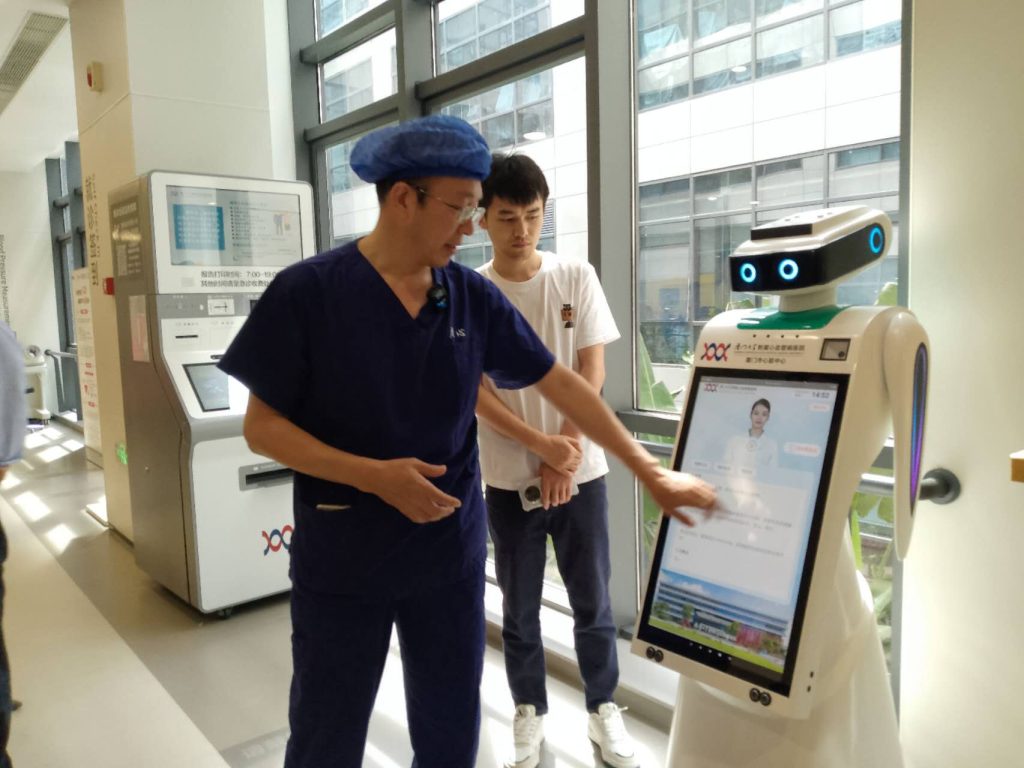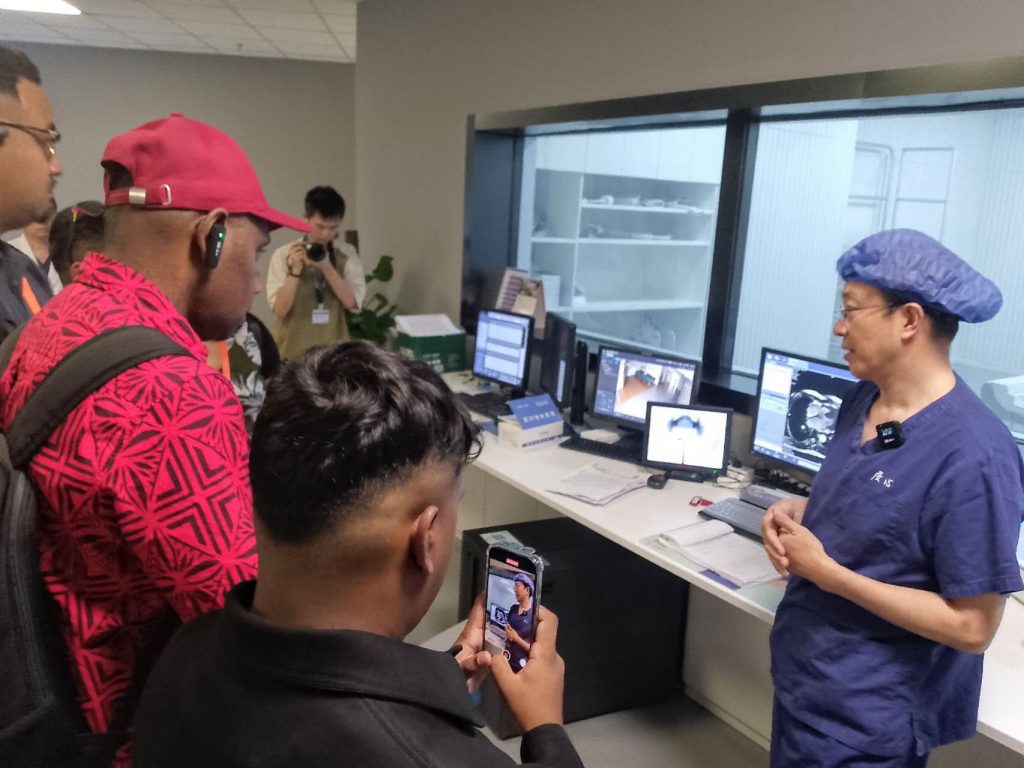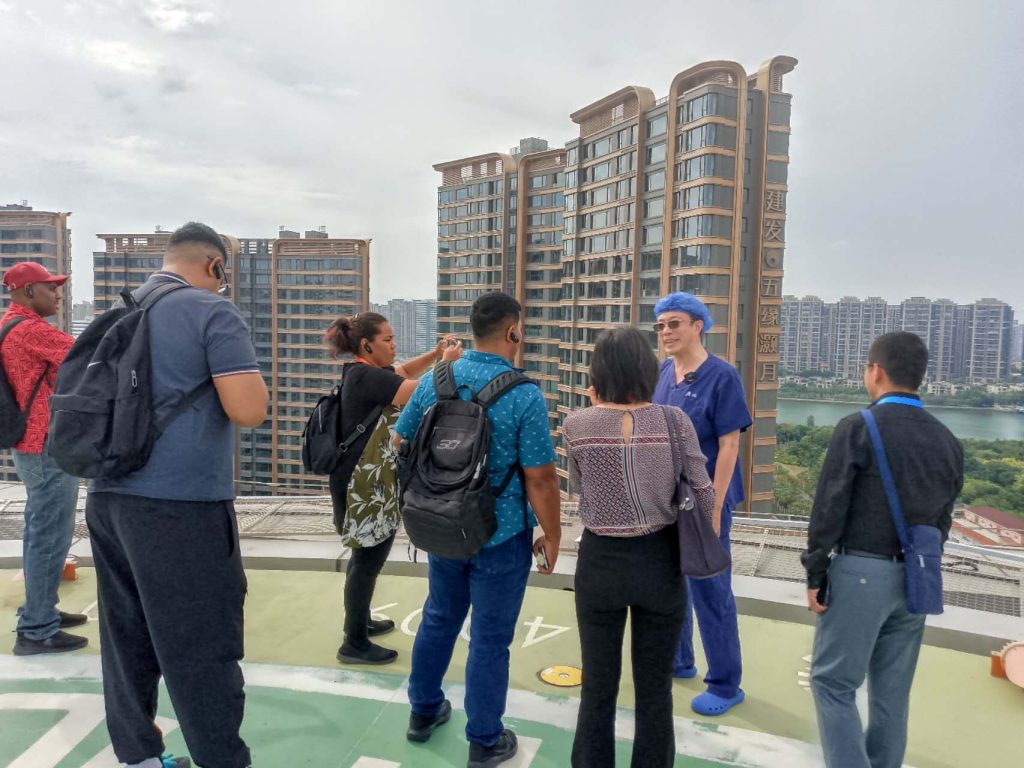WITH sheer commitment to accomplish its goals of building a high-quality hospital with top patient satisfaction level and continued exploration of medical ethics, medical skills, humanities and innovation, the Xiamen Cardiovascular Hospital in Fujian Province has emerged as a leading exceptional specialist cardiological service provider in China.
The hospital, which is affiliated to the Xiamen University, serves as a Regional Medical Center for Cardiovascular Diseases and also as a Sub-Center of China’s National Clinical Research Center for Cardiovascular Diseases.
Journalists from Pacific Island Countries (PICs) undertaking a media exchange program for International Journalists in China had the opportunity to visit and witness the advanced services provided by the hospital on Tuesday 27 May while in Xiamen to cover the third China-PICs Foreign Ministers’ Meeting.
Our visit covered the Patient Registry Department, where we witnessed incoming patients do self-check-ins and diagnosis on self-service kiosks to other departments, including the Intensive Care Medicine, Cardiac Rehabilitation Center, Health Management Center and Cardiac Surgery where we witnessed doctors at work and also the helipad that facilitates helicopter landing and take-off in any emergency situation.

President of the Xiamen Cardiovascular Hospital, Wang Yan said since its establishment, the hospital became the most influential institution for diagnosis and treatment of intractable cardiovascular diseases, and a sub-center of the National Clinical Research Center for Cardiovascular Diseases.
“Since our establishment in 2001, we have committed ourselves to providing the best service in cardiology and have constantly been doing exploration into medical ethics, medical skills, humanities, innovation and other relevant aspects.
“With 20 years of tireless efforts, we emerged as the most influential medical institution for diagnoses and treatment of intractable cardiovascular diseases within the region, providing quality services to more than 290,000 patients annually, completing more than 21,500 cardiac surgeries of various types, and were awarded the highest-grade evaluation (A-grade) of public hospital in China for years.
“The hospital is open and inclusive, with longstanding ties and cooperation with renowned cardiology centers in Singapore, Australia, the United States, India and so forth.
“We are committed to becoming a world-class, high-level cardiovascular hospital and sincerely welcome friends from all over the world to come to China to exchange and cooperate with us and to learn and grow. We are capable of carrying out heart transplant and various endoscopic minimally invasive heart procedures,” Dr Yan highlighted.

Dr Yan said while carrying out all regular interventional therapy for cardiovascular diseases, the hospital focusses on the treatment of complex coronary artery disease, valve disease, arrhythmia patients, and other patients with critical condition and constantly develops new technologies for clinical diagnosis and treatment.
“This hospital carried out the first “minimally invasive left ventricular volume reduction surgery (Revivent TC)” outside Europe and the first transapical AMEND mitral annuloplasty in the Asia-Pacific region, accumulating a lot of comprehensive experience in the field of interventional therapy of heart valve disease, and completed the most transcatheter edge-to-edge repair procedure of tricuspid valve in China.”
Dr Yan said Xiamen Cardiovascular Hospital also participated in the development of many innovative cardiovascular interventional devices, and has been leading multi-center clinical trials.
He said the hospital, in collaboration with the Xiamen University School of Medicine, established the Institute of Cardiovascular Diseases in October 2016 with the objective of applying research to clinical practice in cardiology.
He said the institute is now a sub-center of the National Clinical Research Center for Cardiovascular Diseases and provides the most advanced cardiovascular biology research platform in China, and even in the world.
“We have set up seven research laboratories for vascular biology, heart biology, regeneration medicine, cell therapy, precision medicine, translational medicine and heart development, two technical support facilities (research animal center, cardiovascular bioinformatics and biotechnology center) and several core labs (stem cell and cell biology research laboratory, high-throughput sequencing and nucleic acid drug development platform, molecular biology research laboratory, zebrafish research facility, SPF-level laboratory animal room and bioimaging center).

Dr Yan saidsince its establishment, the institute has introduced talents-cultivation globally, developing the capacity of young scientists, and gathering a research team from across multiple disciplines.
“To cultivate outstanding talent in cardiovascular diagnoses and treatment and to promote the global advancement of cardiovascular health, we launched a Heart Sapling Visiting Scholar Program allowing 15 to 20 young cardiovascular specialists from Brazil, Russia, India and South Africa and China’s Belt and Road partner countries to receive training at the hospital for a period of six months or one year.
“To date, we have undertaken over 100 scientific research programs and received funding worth over 80 million RMB from the National Ministry of Science and Technology’s Key R&D Program, National Science Foundation of China (Strait Joint Fund Project, Surface Project and Commission for Youth), and Key Projects of Chinese Medical Association Cardiovascular Branch and etc.
“Focussing on precision and translational medicine, we aim to elucidate mechanisms of fundamental cardiovascular processes, such as heart development on the single cellular level, cardiomyocyte differentiation and death, aging issues of the heart and etc. We have the international leading teams in the fields of cardiovascular-related stem cells study and non-coding RNA functions in cardiovascular diseases.”
Dr Yan added, “we are also putting our efforts into applying research to clinical practice through multi-omics methods. Along the way to becoming a world-class cardiovascular research center, we will continue to persevere, pioneer and innovate.”
As one of the teaching hospitals of Xiamen Medical College and also a practical base of Fujian Medical University, he said Xiamen Cardiovascular Hospital has also been conducting teaching and clinical practice training since 2001.
“This hospital became one of the official affiliated hospitals of Xiamen University in 2016. Our forging of strong alliance and resource-sharing have advanced our hospital in the fields of medical education and scientific research.”
“The Research and Education Center occupies an area of over 2,000 square meters, containing classrooms, seminar rooms, clinical skills practice rooms, academic lecture halls and etc. It will soon open a well-stocked medical library with electronic reading rooms and online bibliographic data bases to provide a conducive learning and energetic working environment for researchers,” he said.
Dr Yan said from 2006 to 2022, a total of 178 graduate students of Xiamen University received training in at the Xiamen Cardiovascular Hospital, including 20 MD and PhD students
“We also run courses for international students in the MBBS (Bachelor of Medicine/Bachelor of Surgery) Program. Besides the teaching schedules, each department routinely organizes lectures, ward rounds, case studies and discussions every week,” he added.
“Our staff also receive vocational and medical training every month. Every year, we invite domestic and international cardiology experts to give lectures, share first-hand experiences and instruct surgeries. We are endeavouring to provide as many opportunities as we can for our students to learn, practice and become a doctor,” Dr Yan further added.
The Xiamen Cardiovascular Hospital is state-owned and receives patients from all over Fujian Province and other parts of China, and welcomes any patient from abroad requiring exceptional specialist cardiovascular service.
By DELI-SHARON OSO
In Beijing, China









